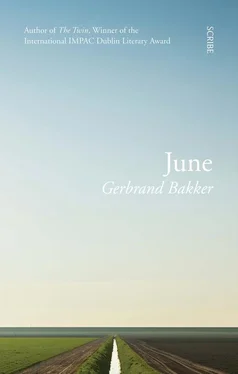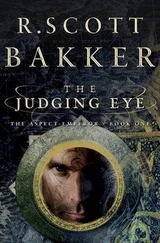Omta’s blue car slows down and pulls over to stop behind a car parked on the roadside. The mayors get out simultaneously and shake hands. As the new mayor — ‘Hartman,’ Röell whispers — walks up to her car, the driver opens her door.
‘Good afternoon, Your Majesty. Welcome to our district. Which, by the way, starts there.’ He gestures at a bridge with white railings further down the road.
‘Good afternoon, Mayor Hartman,’ she says, doing her best to sound cheerful. ‘I am delighted to be here for this — regrettably brief — visit.’
‘Shall I lead the way?’
‘Please.’ As she gets back into the car, not forgetting to look at the driver, who invariably turns it into some kind of amateur theatrical performance, she notices her leather gloves lying on the back seat. She’s already shaken two mayors’ hands with hers bare. High time for a cigarette. Röell can scowl all she likes.
Balancing on the bridge railing are two boys in swimming trunks. One a redhead, the other brown-haired, both with their arms spread wide, fat drops of water falling from their elbows onto the freshly painted rail. When the car drives over the bridge, they jump, as if they’ve been waiting for that very moment. Grins on their faces. Apparently a royal visit doesn’t interest them. Even if they did both look at the car before making the leap.
‘Stone of help.’
‘What?’
‘Stone of help.’
‘You’ve lost me.’
‘That farm there. Eben-Ezer.’
The atmosphere here is very different. The countryside’s older. The farms are more varied, the gardens more mature, the trees taller, the ditches full of water. Fewer crops, more cows. Ah, there’s a shiny new van with the words Blom’s Breadery on the side. The van is parked at an angle in front of a gleaming shop window bearing the same name. Apparently the baker is one of the ninety per cent of businessmen who have renovated and modernised. ‘Breadery’ is amusing. Modern too. She searches for shops that fall into the other ten per cent, but can’t see any. Then she hears cheering and sees the crowd. She takes a deep breath and pulls on her gloves. Until lunch she won’t shake a single hand with hers bare.
The driver opens the door. ‘Your destination,’ he says.
‘Without any accidents,’ she answers. She never addresses him by his Christian name.
Then everyone surrounds her again. Röell, of course, who has got out of the car unaided as the driver can’t be everywhere at once. Van der Hoeven, Beelaerts van Blokland, Commissioner Kranenburg. Where’s that nun got to? Is she still in the car? They won’t lead her to tables full of shrimp or fish here; it’s not a fishing village. Here, they’re going to dance. She passes her handbag to Röell; she’ll need to keep her hands free. The Polder House is a large farmhouse: whitewashed, with espaliered lindens out the front. She certainly can’t get lost, there’s only one possible route, right through a double line of children and mothers. Ah, there are two little ones with a bunch of flowers. The mayor tells her their names and she catches something about the butcher and the baker. These must be their children.
‘Oh, thank you very much,’ she says. ‘What beautiful flowers, and so cleverly arranged. Did you do that yourselves?’
They stare at her as though she’s speaking German.
‘Of course not,’ she says to make up for it. ‘The florist put it together, didn’t he?’
The girl nods bashfully, and she touches her gently on the cheek with a leather finger. The boy doesn’t look at her and the relieved children slip back into the crowd.
Aren’t these the very same children who were standing on the dyke this morning? The same heads of blond hair, the same bare knees and knitted cardigans. The very same children? An icy silence is hanging over them, as if they’ve all been struck dumb by pure awe. Awe or nerves. After introducing the children, the mayor hasn’t said another word. She shakes her head. Röell takes her by the elbow. She pulls her arm free without looking at her private secretary and walks on slowly.
And what about that, what kind of peevish face is that boy pulling? Red hair and freckles, his head hanging. He’s looking down at his feet, which are in new sandals. What does he have to look so indignant about? She almost takes a step towards him to ask what’s bothering him. Why his red, white and blue flag is down at his knees. And while she’s at it, she can ask the other boy, the bigger one — who has taken him by the hand and definitely isn’t his brother, because his hair is raven — why he’s looking at the little boy and not at her. It even makes her feel a little sad herself, that tummy thrust forward in anger and the transparently new Norwegian cardigan with its brass buttons, almost certainly knitted by his grandmother. Everything in the past few weeks building up to this one day, the kind of day that’s over before you know it, and then being cross into the bargain, so that almost everything goes by in a blur. All around her, photographs are being taken, she hears the cameras clicking and there are even flashes, although that’s hardly necessary in weather like this. She slows down a little, as if she can’t go on until the boy has looked up at her, but the mayor has already walked ahead and she can feel the rest of the company jostling at her back.
She directs her gaze at a group of men and women in traditional costume a bit further along where there’s a little more space. The children are holding little flags, but none are waving them. If not for the breeze, the flags would be hanging limply in the air. She hopes they’ll have sherry in the Polder House. The skirts swish, the clogs of the black-suited men stamp on the asphalt. The bunch of flowers is annoyingly heavy. She wants her bag, she wants her cigarettes, she wants to sit down.
‘This way please, Your Majesty. Luncheon is ready inside,’ says the mayor.
Just say ma’am, she thinks. Ma’am and lunch.
In front of her, Jezuolda Kwanten slips inside, pencils and sketchbook at the ready.
‘You can withdraw here for a moment if you would like to,’ a woman says. ‘With your lady-in-waiting. There’s a toilet you can use if you so require.’ She doesn’t correct her.
Röell and Jezuolda Kwanten are sitting in the mayor’s office, which, like this room, smells of fresh paint and wallpaper glue. All these lavatories, she thinks. All these lavatories everywhere, just for me. She has removed her gloves and raps a strangely shaped wall with a knuckle. It sounds hollow. Temporary, she concludes, and wonders where the men in the company have to go now the urinal’s been walled off. She thinks of the lavatory at Amsterdam Central station: the motionless air, the unventilated rooms, the dusty curtains, the lavishly upholstered chairs that are almost never used. She feels the toilet paper: Edet, two-ply. A virginal bar of soap on the washbasin. I am sixty years old, she thinks. For more than twenty years I have been sitting in my official capacity on lavatories like this. How long can anyone bear it? She rises, washes her hands and flushes to keep up the pretence.
Bottles of apple and orange juice are arranged on the enormous French-polished table in the mayor’s office. And one bottle of sherry. Röell is drinking orange juice, the artist doesn’t have a drink. She pours two glasses of sherry and holds one out to Jezuolda Kwanten.
‘No, thank you. I don’t drink alcohol at all.’
‘But you’re an artist.’
The sister smiles, sits down on the most spacious seat and opens her large sketchbook.
The Queen smiles too. The glasses need emptying. It would be strange to leave the mayor’s office while there is still a full glass on the table. The bunch of cigarettes sticking up from a vase needs to be thinned out a little too, at the very least. Lucky Strikes. Röell screws up her eyes but offers her a light all the same. She strolls around the spacious room and ends up in front of a large mirror. She studies her reflection, toasts herself and blows smoke in her own face.
Читать дальше












